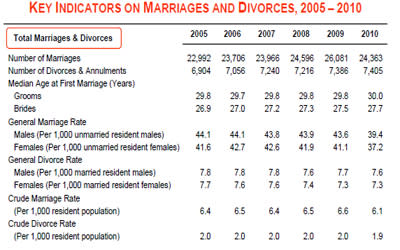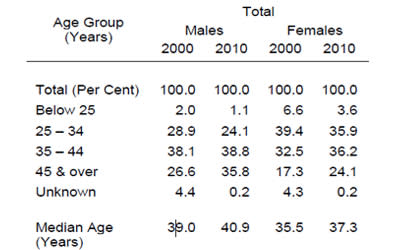Marriage rates drop to historic low in 2010: survey
A record low proportion of people in Singapore tied the knot last year, according to the figures the Department of Statistics (DOS) released on Friday.
Also, the number of marriages fell by 6.6 percent to 24,363 marriages last year from that of the year before, the first decline since 2003, the department's annual publication on marriages and divorces revealed.
The general marriage rates -- the number of marriages out of every thousand unmarried residents between 15 and 44 years of age -- declined to a "historic low" in 2010, the DOS said.
There were only 39.4 marriages for every 1,000 unmarried male residents and 37.2 marriages for every 1,000 unmarried female residents in 2010, compared to 43.6 and 41.1, respectively, in 2009.
There was, however, an 8 percentage point rise in inter-ethnic marriage in 2010 compared to 2000. About half of the marriages were between Chinese grooms and brides not of Chinese, Malay or Indian ethnicity.
Marriage rates fell across the board for those under 30. The 25 to 29 age group saw the largest fall in marriage rates last year compared to 2000.
Of those who married, however, more did so when they were slightly older.
Associate professor Paulin Straughan, deputy head of the National University of Singapore's (NUS') sociology department, explained the fall in marriage figures.
Women, who are more educated today, have greater opportunities in the work place, she noted. "This means that getting married is no longer a linear progression in early adulthood," said Prof Straughan.
Working women also have economic independence, so instead of marrying for financial security, they expect marriage to value-add their lives and have higher expectations of marriage and their spouse, she said
Concurrently, work has become "a lot more competitive" and people have little time left to nurture relationships to find Mr or Miss Right, she added.
Prof Straughan pointed out that most people in the 25 to 29 age group believe they are at the stage in their life where career aspirations are among their top priorities.
NUS sociologist Tan Ern Ser pointed to value shifts and lifestyle changes as a cause for the fall in marriages. He noted, "Cohabitation is also a possibility".
Those in the 25 to 29 age group could delay marriage because of reasons involving further education, debts and family responsibilities, he added.
Last year, men and women also split up at an older age compared to 10 years ago.
And while there were 20 more cases of divorces and annulments compared to the year before, the rate of divorce dropped slightly to 1.9 per 1,000 residents from 2 per 1,000 residents.
Almost all non-Muslim divorces cited "unreasonable behaviour" and "having lived apart or separated for three years or more" as their reasons, while Muslim couples cited "domestic violence and abuses" and "financial problems" as their top two reasons.
Prof Tan, who felt the figures seem "quite stable", said his hypothesis is that couples who marry later are less likely to divorce.
The figures may suggest "we are taking more care in spouse selection and many are only committing when they are certain they found the right partner," said Prof Straughan, who termed the fall in divorce rates "good news".
"But it also means that they take a longer time! So we must ensure that young Singaporeans start this process earlier," she said.
"We must work seriously towards achieving a good work-life balance so that younger Singaporeans do not feel that they have to choose either one or the other," said Prof Straughan.
She called for a review of the performance-based evaluation system.
"The current reward system encourages employees to overwork," she said. "For the social health and stability of Singapore, we must ensure that employers look towards human resource as a long-term investment and discourage short-term exploitation."






